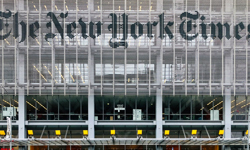Local World, set up last year with the merging of the DMGT’s Northcliffe division and Iliffe with the backing of a 20 per cent investment by Trinity Mirror, seemed to be the first such move in many years.
David Montgomery had assembled a group of long-standing publications, free from the burdens of significant debt and capital expenditure needs, and offered a potentially new route for the future prospects for the industry as it faced the seemingly unending structural maelstrom of change.
How he and Steve Auckland, his CEO, are doing and the tactics they are utilising to drive the business, are not subjects for today – but whether the law will allow them to do so is.
For the Government remains disinterested in the sector, with its thinking on media issues in general, and regional and local media in particular, being too disjointed.
Three significant departments (Business, Culture, Media and Sport, and Communities) all have an interest in regionals and locals, but don't seem to talk with each other about them – and with not one seemingly willing to take a lead.
Eric Pickles may make grandstanding noises about the problems of local authority publications, but these are, in reality, not-so noisy neighbours who are irritations for some, rather than deepset issues for most.
Maria Miller may be devoting much of her media-allocated time (as her predecessor at DCMS, Jeremy Hunt, did) to the ramifications of Leveson LJ, but, again, this is more of an irritation to regionals and locals, albeit one that could prove costly in both financial and time consumption terms.
But it is Vince Cable’s business department, and two of its agents on earth, the Competition Commission and the Office of Fair Trading (OFT), that again are looking ominously in the direction of the sector for all the wrong reasons.
This stems from a Competition Commission ruling earlier this month that said that, following Global Radio's takeover of The Guardian’s GMG Radio, the new business must sell stations in seven of the nine areas the two companies' operations overlapped because of concerns about lower competition and therefore hiked prices for advertisers.
The ruling gave a very narrow interpretation of what the advertising market actually is, saying that there had to be competing opportunities in local radio, in this case, but also by implication, in local and regional newspapers too.
Following the Global news, it has become known that the OFT is having a very close look at the Local World deal – and may well offer the same narrow, historical, view of what the advertising market is – rather than what it has actually become over the last 15 years or so.
My article in the March/April 2013 edition of InPublishing predicted that the slight overlap in the Derby/Burton and central midlands areas might provoke some interest.
But if this is the case, it would appear to be more evidence that the OFT, and therefore the Government, still doesn't understand the media market and has learnt nothing from its uninformed and naive Kent Messenger/Northcliffe decision of 2011, when the transferring of seven titles to the KM Group was disallowed because of the demands of print plurality.
The interpretation is that local newspaper advertising is different to that in national newspapers, doesn’t compete with local radio, has nothing to do with the spend in outdoor and direct mail – and has no relationship with online.
The OFT's arguments of markets would therefore conclude that Craigslist in the United States, for example, has had no effect on newspaper classified columns, nor does it compete in the same markets.
Yet Craigslist, almost singlehandedly, brought the US newspaper market to its knees.
The OFT appears to be working from a purist approach to business and economics totally at odds with real life. Online competes with local media companies. Why the OFT cannot see that is incomprehensible. There still seems to be a belief that mysterious editors-in-chief control the content of newspapers from afar – and that advertisers have but one shop front in which to sell their wares. If only, would say the industry.
In this way the OFT is doing nothing to help a significant sector of the British media industry, merely establishing barriers at an attempt at saving it.
Consolidation of this kind on its own will not save the industry, but it is one of the ingredients that may help it. Regional groupings will lower back office costs and help offer bigger sets of eyes to advertisers – but this is just part of the new story that needs to be developed.
And OFT/CC inquiries are expensive for businesses, as the KM Group will testify over its aborted Northcliffe deal two years ago. Many will feel that going through the pain just isn’t worth it.
That this is a relatively small deal and one that is a forerunner of the big swaps that the big four (Newsquest, Johnston, Trinity Mirror as well as Local World) may well be planning to enable substantial regional groupings to be formed is a worry.
And that it comes at the same time as the Government has shown it is incapable of taxing Google's UK profits (where much of the total advertising market has migrated) adds to the irony of all that is happening.
So a plea: let’s have a lead government player for regional and local media, one who understands what is actually happening, who can take an overview and who can knock heads together. It’s not a hard ask.












